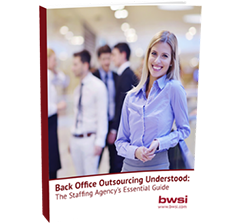
Be a Friend or Not
Posted on 3/29/17

What to do when a client or contingent worker friend requests you on Facebook?
With the ubiquitousness of social media, particularly Facebook, any staffing agency is left with the issue of what kind of policy they should set for their internal employees, recruiters, and sales staff. To “friend” or not to “friend” is far from a simple decision and one that no matter what you decide needs to be effectively communicated to your staff. There are serious legal ramifications that could arise from accepting friend requests on Facebook related to the Americans with Disabilities Act (ADA) or Genetic Information Nondiscrimination Act (GINA) given how freely most people post on their Facebook profiles. While there is nothing inherently illegal about “friending” clients or contingent workers, if you choose to do so, treading lightly is key.
Facebook vs. LinkedIn
Facebook is intended to be much more personal and freewheeling than a more professional site such as LinkedIn. Facebook is meant for friends and family and even if you attempt to segregate your friends using lists or other methods, Facebook constantly encourages you to grow your friends list based on connections with your friends. Facebook’s new Graph Search allows you to search for all kinds of information that you may not want more professional acquaintances to see such as pictures in which you are tagged, statuses you have commented on or liked, and other data that is public and accessible by the graph search.
LinkedIn is a more professional site that is more business and employment related. Not many people on LinkedIn are posting about the rager they attended the past weekend, their fight against cancer, trying to get pregnant, or their mental health issues like they are on Facebook. You can’t conceal your activities on Facebook (there are too many opportunities to identify you) and quite frankly, given Facebook’s intent, why would you want to do so - within reason? Even if you are overly diligent about what you post on Facebook, your client or contingent worker may not be so careful, and put you in a position to have to take action. One example would be a posting showing the contingent worker lighting up a blunt or other illegal drugs and you work for a drug-free workplace.
The client issue
The issue of friending clients is less of a gray area than friending contingent workers—there aren’t as many legal issues to consider, but definitely are business issues you may want to take into account. Accepting a friend request from a client makes it much easier to contact you at odd hours outside of the office via Messenger or a direct post. While the new overtime rules are in limbo, one can expect at some point they will be sorted out and the salary threshold will be rising—responding to a client request via Facebook could be compensable time if after hours. You also have to ask yourself if you are comfortable with clients having more intimate personal knowledge about you and vice versa. Many people share political commentary on their Facebook pages—what if your client doesn’t “feel the Bern” so to speak and you do or you are supportive of LGBT rights and your client feels it is a religious freedom issue. These kinds of things can have a direct and real financial impact on your agency and/or personal commissions.
An issue that is often overlooked is you could be violating Facebook’s terms of service (TOS) if you accept a significant number of client friend requests. Facebook’s TOS explicitly state "You will not use your personal timeline primarily for your own commercial gain, and will not use a Facebook Page for such purposes." You could be faced with having your Facebook profile suspended or even deleted for violating the TOS unintentionally. With the new Facebook Jobs functionality, it is even more tempting to bring clients and candidates into your social media circle which could result in a higher probability of violating the TOS.
Social Media Guidance
Given the pitfalls of blending personal social media accounts with employee’s professional lives, BWSI recommends that social media interactions be directed and limited to LinkedIn. Most people think twice about what they post to their LinkedIn profiles as opposed to the miasma of Facebook timelines. Keeping contingent workers at arm’s length and sandboxing them to LinkedIn can only serve to protect both your internal employees and your staffing agency. Furthermore, from a business development standpoint, LinkedIn makes it much easier to keep track of contingent worker’s employment prospects after they leave your employ, thus possibly opening up a new avenue for sales prospecting with the people you have already served! This is also just as true for clients—as your contact at your client moves to a different employer you have an excellent prospect and relationship with them that you can mine for new business and hopefully make a new client.
One thing that BWSI recommends is to have an agency or business account on LinkedIn that you can also direct contingent workers and clients to connect at that location. You can publish professional updates, job openings, and other valuable content to keep them engaged. By having them connect with your company account you can protect yourself when the recruiters or sales staff move on to other opportunities and not lose the connection with the clients and contingent workers if they only connected directly to that recruiter or sales person.
Social media is constantly evolving and opening up new avenues of opportunity and, as such, BWSI also recommends that you review your social media policies on an annual basis to insure their effectiveness and compliance.Free Ebook

Maintaining an accurate and effective back office is critical to the success of any staffing agency.